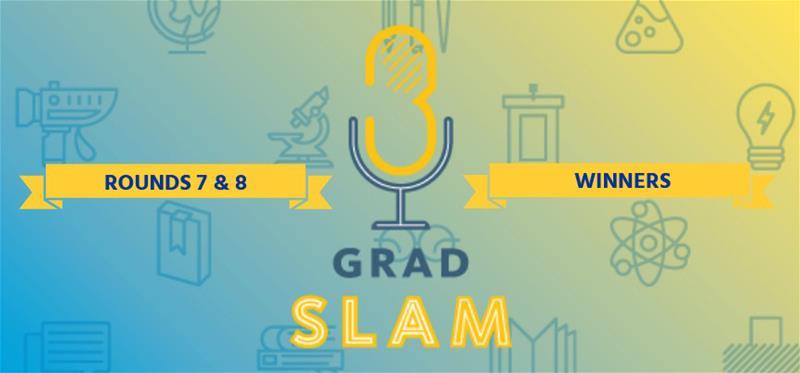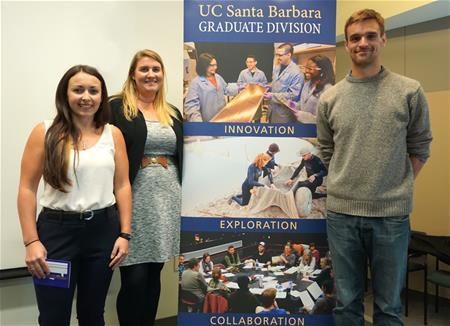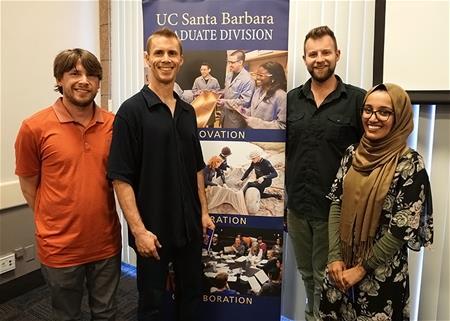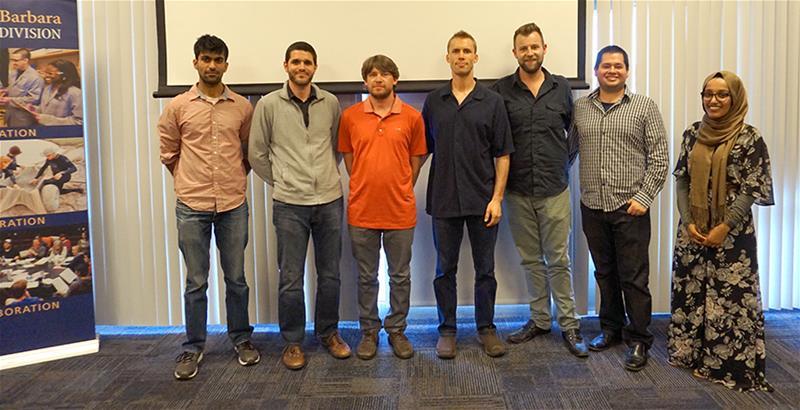Top Stories
Find out who the winners are from Preliminary Rounds 7 and 8 of the 2016 Grad Slam!
Day 4 of the Grad Slam competition is over. We usually have six more winners, but once again, there was a tie, this time in Round 8. Each of the seven Grad Slam preliminary round winners received a $50 UCSB Bookstore gift card and will go on to compete in the Semifinals.
Round 7
Amanda Kautzman
Will Summers
Sarah Neace, People's Choice
Round 8
Gokh Amin
Jeffrey Hunger
Joshua Kuntzman
Joseph Palazzo, People's Choice
View photos and read synopses of all the talks from Rounds 7 and 8 below. You âmay find the full Grad Slam competition schedule here.
â
Round 7
Thursday, April 7 | 11 a.m. to noon
Engineering Science Building 1001
Adam Arce | Earth Science
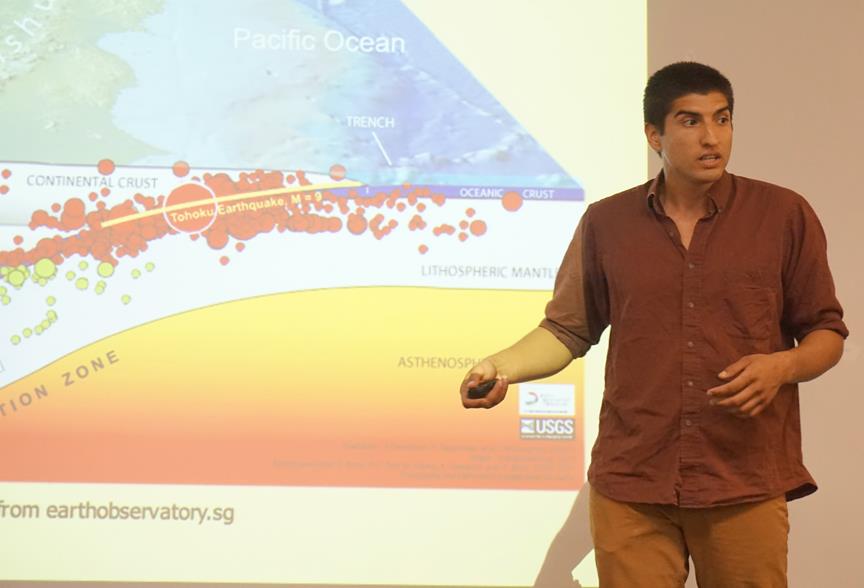 Understanding Earth's Interior from Listening to It Break
Understanding Earth's Interior from Listening to It Break
Intermediate depth earthquakes (IDE) are phenomena that nucleate at depths of 70 to 300 km. Infrequent and poorly understood, they are enigmatic in regard to their rupture mechanism(s) and characterization. My study will systematically characterize seismic signals from large magnitude (M > 7) IDE to better understand why, how, and where such events occur.
Zhe Fu | Electrical & Computer Engineering
Deep Learning for Health Informatics
My talk will discuss how machine learning and artificial intelligence can help extract insights from health data collected from smart phones, wearable electronics, and clinical records.
Song Gao | Geography
Earth's Biggest Seasonal Human Migration on a Map
The spring festival migration is the world's largest annual seasonal human migration. If private vehicles are included, 3.7 billion trips in total will be made during the 40 days, an increase of 100 million trips over last year. What does that look like? How could we visualize the spatial patterns on a map?
Amanda Kautzman | Psychological & Brain Sciences
Building a Retina from the Genome Up
Genes are responsible for determining the characteristics of organism. The retina is a part of our central nervous system and many genes control its development. Some genes will determine how many cells, or neurons, will make up the final composition of the retina, which is necessary for our ability to see. My project will reveal how the gene Xkr8 determines the precise number of cells that contribute to a functioning retina.
Sarah Neace | Global Studies
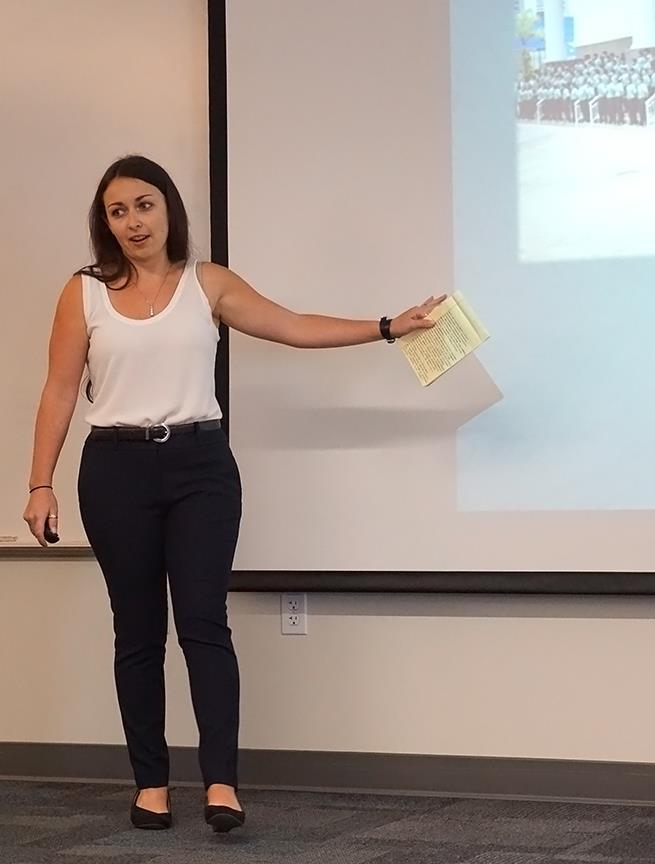 Religious Violence in Brazil: The Rise of Militant Pentecostalism and Implications for Afro-Brazilian Religions
Religious Violence in Brazil: The Rise of Militant Pentecostalism and Implications for Afro-Brazilian Religions
Pentecostalism is growing rapidly around the globe and especially in Brazil. Extremist groups of Pentecostals, and large neo-Pentecostal churches in particular, are spreading hate and physical violence against Afro-Brazilian religions, vulnerable minority religions derived from African traditions. In seeking to understand how this is happening, I have discovered that some groups of Pentecostals are militarizing in some ways, including promoting a narrative of cosmic war that poses African traditions as the enemy. Finally, I will discuss the ways in which Pentecostal groups are claiming that they are the true victims of persecution because they feel it is their true religious freedom to discriminate and they should not be discriminated against for doing so.
Will Summers | Materials
Designing New Materials for Jet Engines
The performance and efficiency of a jet engine depend on the extraordinary high-temperature materials within the engine core. My talk will address research that is being done to introduce ceramic composite materials for this application that have the potential to revolutionize air travel by improving fuel efficiency and dramatically reducing the engine weight.
Round 8
Thursday, April 7 | 3 to 4 p.m.
UCen, Flying A Studios
Gokh âAmin | Global Studies
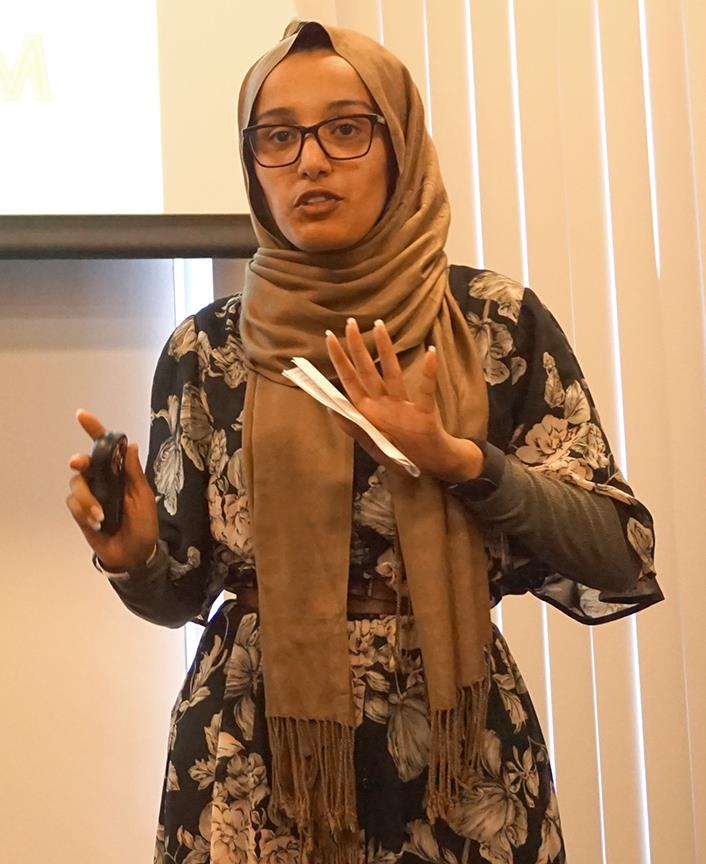 Seven Years, Three Yemens: The Empowerment and Disenfranchisement of Yemeni Women Between 1989 and 1995
Seven Years, Three Yemens: The Empowerment and Disenfranchisement of Yemeni Women Between 1989 and 1995
In 1990, the People's Democratic Republic of Yemen and the Yemen Arab Republic unified to form the Republic of Yemen. This unification of the Middle East's only communist government and a military-tribal polity would have drastic consequences for Yemenis residing in the new state. This study seeks to understand the situation of Yemeni women âbefore and after the unification, asking what explains the institutional disenfranchisement and growing social exclusion of women in Yemen between the years 1989 and 1995.
Jacob Berenbeim | Chemistry
Shedding Light on Life
The molecular building blocks of life are likely those which best resisted ultraviolet light damage in the zero atmosphere environment of our prebiotic earth, and it all comes down to what can happen in one million of a millionth of a second.
Kevin Delucio | Counseling, Clinical, & School Psychology
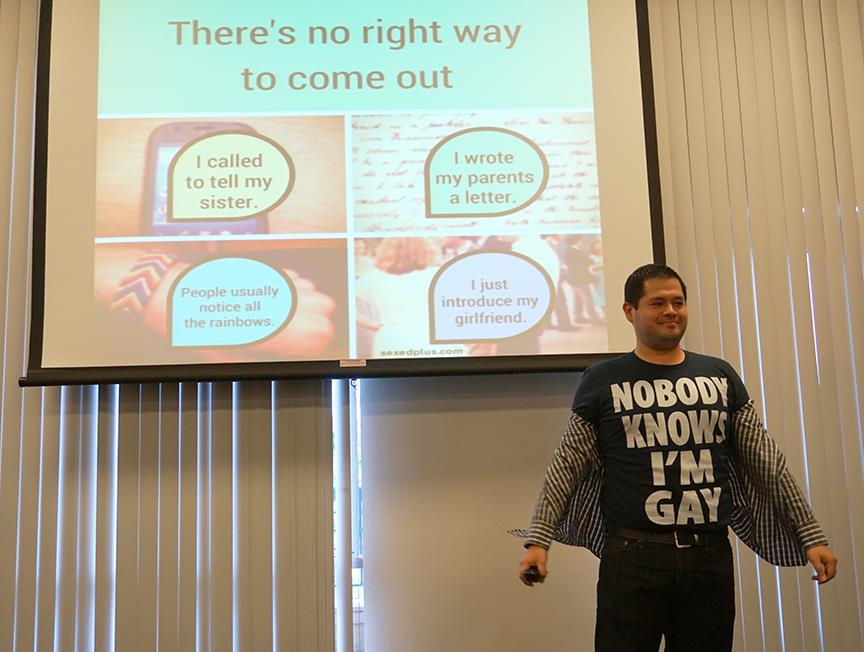 Come Out, Come Out, However You Want: Exploring an Alternative to Verbal Disclosure of Gay Identity
Come Out, Come Out, However You Want: Exploring an Alternative to Verbal Disclosure of Gay Identity
Mainstream depictions of "coming out of the closet" - or "coming out" - present the process as a verbal disclosure of one's gay identity. However, given that prominent models of gay identity development were normed on white men, developmental processes may look different for gay men of color. In this presentation, I will outline how conceptualizations of "the closet" and the coming out process may serve to marginalize gay people of color. I will also explore a potential alternative coming-out strategy among gay Latinos that is not detrimental to their psychological well-being.
Jeffrey Hunger | Psychological & Brain Sciences
The Notorious B.M.I.
Body mass index (BMI), a metric of a person's weight scaled against their height, is commonly used to classify individuals as healthy or unhealthy. Increasingly, and more alarmingly, BMI is being used by employers to penalize employees who fail to meet a BMI considered "healthy." Why is this so alarming? As I will show, BMI is a notoriously flawed marker of actual cardiometabolic health, misclassifying the health of nearly 75 million U.S. adults. This should be the final nail in the coffin for both BMI and our broader cultural obsession with weight as a determinant of health.
Joshua Kuntzman | Education
Educational Dialogs: Uncovering the Foundation for School Reforms
Many practical "solutions" for improving education in the U.S. work actively against societal expectations that teachers be interactive, adaptive, and principled in communicating knowledge to learners. Last year, I presented an educational theory, "analogous personalization," developed to highlight the primacy of personalized teaching approaches in effective education. This year, my topic will be the concrete and practical, rather than the theoretical, results of the research: I will demonstrate the socially complex nature of learning-centered interactions, overview the findings of my university classroom research, and explain how this accurate and complex understanding of interpersonal learning dynamics - where relational and academic outcomes are intertwined - is fundamental to effectively improving education in the U.S.
Joseph Palazzo | Bren School of Environmental Science & Management
Waste Opportunities: The Real Reason to Recycle
The most profound environmental saving potential of recycling is its ability to avoid the extraction and processing of raw materials, as opposed to the simple diversion of waste from landfills. I will show my research on the case of vehicle light-weighting using aluminum, where this misconception has a dramatic impact on the environmental outcome. Then, I will conclude that recycling is a massive opportunity that we cannot take for granted, and that going forward we have an obligation to figure out how to maximize the avoidance of raw materials from recycling.
Kaushal Patel | Physics
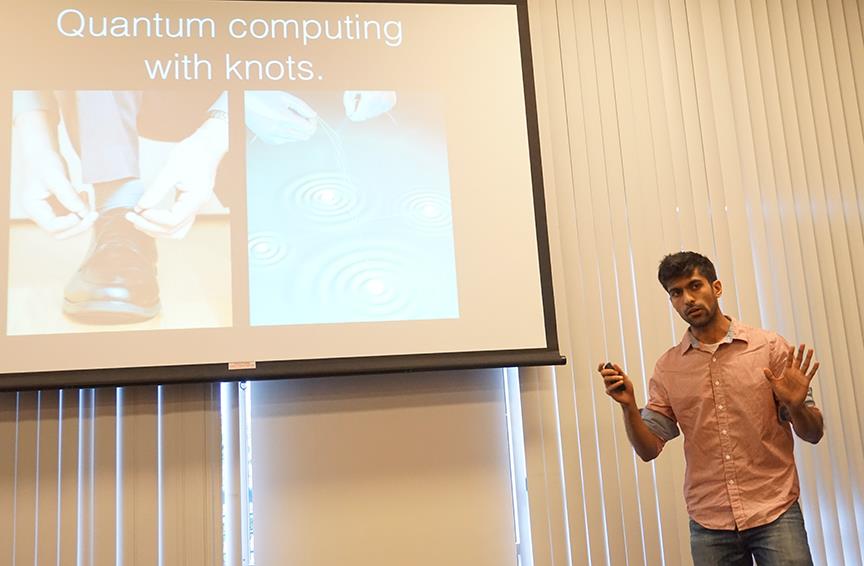 Man vs. Nature: The Dawn of Quantum Computing
Man vs. Nature: The Dawn of Quantum Computing
I will briefly introduce quantum computing, why it would be revolutionary, and why it has been difficult to realize. I will then explain the idea of topological quantum computing, and how it aims to resolve some of these difficulties.
Elijah Spina | Molecular, Cellular & Developmental Biology
Good As New: Evolution Meets Data Science to Predict New Therapies for Regenerative Medicine
Some animals can completely regenerate lost limbs or damaged organs; however, humans and many other animals seem to have lost this ability. The majority of genes found in humans can also be found in highly regenerative species, but humans have evolved to use these genes differently to control wound healing and regeneration. I've identified coordinated subsets of these genes in several highly regenerative animals and then determined which subsets are associated with human development, wound healing, and tissue growth. Future studies can use this information to design new treatments aimed at promoting regeneration in patients suffering from degenerative diseases or physical traumas.
